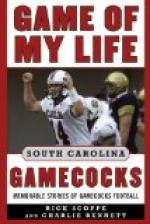The slaves had three ways of detecting thieves, one with a Bible, one with a sieve, and another with graveyard dust. The first way was this:—four men were selected, one of whom had a Bible with a string attached, and each man had his own part to perform. Of course this was done in the night as it was the only time they could attend to such matters as concerned themselves. These four would commence at the first cabin with every man of the family, and one who held the string attached to the Bible would say, “John or Tom,” whatever the person’s name was, “you are accused of stealing a chicken or a dress from Sam at such a time,” then one of the other two would say, “John stole the chicken,” and another would say, “John did not steal the chicken.” They would continue their assertions for at least five minutes, then the man would put a stick in the loop of the string that was attached to the Bible, and holding it as still as he could, one would say, “Bible, in the name of the Father and of the Son and of the Holy Ghost, if John stole that chicken, turn,” that is, if the man had stolen what he was accused of, the Bible was to turn around on the string, and that would be a proof that he did steal it. This was repeated three times before they left that cabin, and it would take those men a month sometimes when the plantation was very large, that is if they did not find the right person before they got through the whole place.
The second way they had of detecting thieves was very much like the first, only they used a sieve instead of a Bible; they stuck a pair of scissors in the sieve with a string hitched to it and a stick put through the loop of the string and the same words were used as for the Bible. Sometimes the Bible and the sieve would turn upon the names of persons whose characters were beyond suspicion. When this was the case they would either charge the mistake to the men who fixed the Bible and the sieve, or else the man who was accused by the turning of the Bible and the sieve, would say that he passed near the coop from which the fowl was stolen, then they would say, “Bro. John we see dis how dat ting work, you pass by de chicken coop de same night de hen went away.”
But when the Bible or the sieve turned on the name of one whom they knew often stole, and he did not acknowledge that he had stolen the chicken of which he was accused, he would have to acknowledge his previously stolen goods or that he had thought of stealing at the time when the chicken or the dress was stolen. Then this examining committee would justify the turning of the Bible or sieve on the above statement of the accused person.




